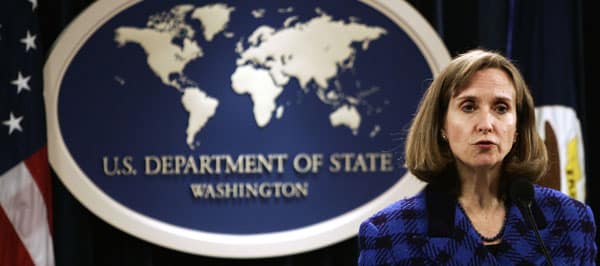This briefing was sent to Paula Dobriansky, who in 2001 was the Under Secretary of State for Global Affairs. She was also the head of delegation and the lead negotiator on US climate change policy[NN1]. The document was authored by then Acting Assistant Secretary for The Bureau of Oceans and International Environmental and Scientific Affairs (OES) Ken Brill. This September 20th meeting was a follow-up to Dobriansky’s earlier sit-down with Randy Randol and the fourth of a series of meetings held with the fossil fuel industry and its representatives during the summer and fall of 2001.
The document provides background information and talking points for Dobriansky’s upcoming meeting with a group of senior ExxonMobil officials. Exxon sent Brian Flannery and Frank Sprow, Manager and Vice President of Health, Safety and Environment respectively along with Corporate Planning General Manager Sherman Glass and Washington Office Vice President James Rouse. Exxon hired Flannery in 1980 as a climate science specialist and he was promoted in 1998 to help the company present its public stance on climate change. As this document recognizes, Brian Flannery was actively participating in the United Nations Framework Convention on Climate Change.
At the request of ExxonMobil, “to give [the State Department] their views on climate change issues and policies,” Dobrianksy was tasked with a similar set of goals as in July: “Welcome the company’s input to the policy review; reaffirm the President’s commitment to international leadership, notwithstanding opposition to the Kyoto Protocol.” Again, the administration defined Exxon as “among the companies most actively and prominently opposed to binding approaches to cut greenhouse gas emissions.” This “unwavering skepticism” makes the oil major “a prime target for vitriol and boycotts by a range of international environmental and social activists.”
Acknowledging Exxon’s own efforts to stress scientific uncertainty, along with its work with the Global Climate Coalition, the briefing concedes shared views on Kyoto, but stresses “the need to include real efforts to cut domestic emissions.” The agency predicted that “Flannery and his colleagues will undoubtedly be interested in gleanings of the U.S. stance at COP7 [the 7th Conference of the Parties].” The briefing gave Dobriansky leeway to “indicate our hope to present ideas pursuant to the President’s initiatives, despite certain criticism from pro-Kyoto forces.” Faced with Exxon’s clear stance against mitigatory climate policy, the administration maintained an open dialogue, providing insight into their international and domestic posture toward climate change.
The briefing concludes with a backgrounder, “ExxonMobil’s Position on the Kyoto Protocol,” and Lee Raymond‘s “A Better Path Forward” statement.


